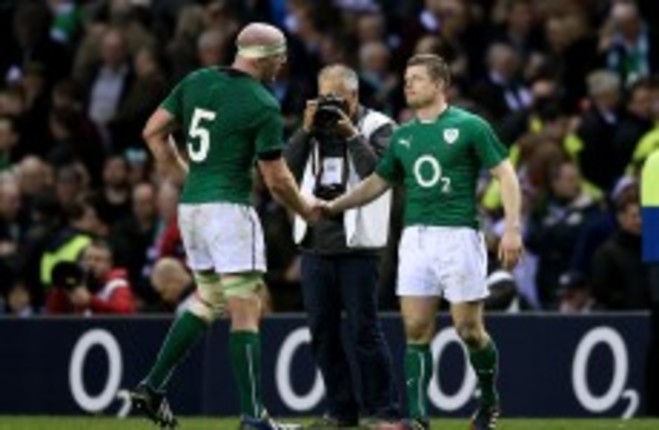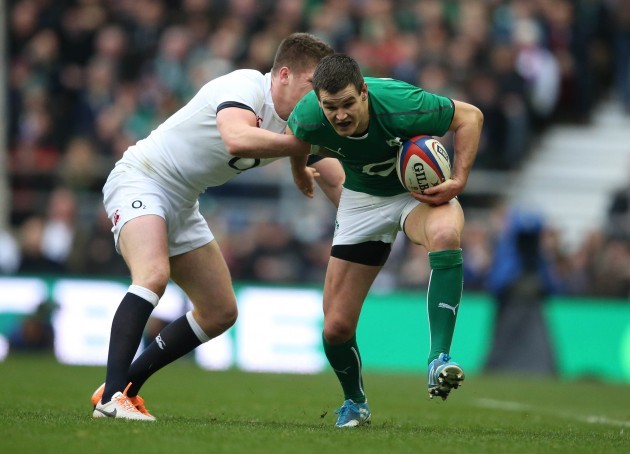AT ONE STAGE yesterday, not long after the final whistle of Ireland’s 13 -10 loss at the hands of England, it seemed as if Joe Schmidt was determined to take up a polar opposite viewpoint from the rest of Ireland.
After the wins over Scotland and Wales he scowled and winced and nit-picked. In his post-match television interview yesterday, he was decidedly upbeat.
Even Paul O’Connell came remarkably close to smiling for the RTE cameras when he listed off the things his pack had done well.
Thankfully by the time the coach and captain made their way around to the main press conference the Kiwi, for one, was closer to the level of spikiness you would expect after losing a Test.
After a sizable chunk of his time in the spotlight was spent in praise of Mike Brown, Schmidt finally got back to what he does best; spotting room for improvement.
“Globally, bits of our kicking game that didn’t go as accurately as I would have liked,” said Schmidt. However, he had earlier defended Jonathan Sexton’s over-hit restart by rightly pointing out that his side had worked their way into a decent defensive shape after the scrum which resulted from the kick out on the full.
Back to the snag list, though:
“I felt we were too loose with the ball… Some of the resourcing of the ruck: People weren’t as square in the ruck as they have been in our last two games.There was a lot of angled entry.”We’ve got to learn to cope with that, because it’s very hard to stay on the ball if you’re being lifted off it. I think that’s one of the things that we’ve got to be able to try to cope with to make sure we can (A) protect our own ball and (B) put pressure on our opponents.”
Oddly enough, however. Schmidt did seem to enjoy the experience of his first tussle with England.
“It was as close to a slug-fest as you’ll get. They’d throw a couple of punches, we’d throw a couple back. Then there’d be a bit of a flurry from them, we’d be on our line and then scramble off it.
“It’s probably one of the few games I’ve seen when there was only one try apiece, yet there was an incredible amount of attacking rugby. I’m not sure what it was like as a spectator, but I felt it was all-action.”
Well, as a spectator it felt hugely frustrating. Ireland were rocked onto the back foot from the very first minute and should have been much more than three points down after five minutes (never mind 40) as Jonny May contrived to drop the ball over the try-line.
When Ireland attacked, they did so with pace an intent, but much of the movement was lateral and the white shirts happily drifted along to cover in great numbers when the ball was moved out wide.
Ireland, you fear, over-thought this game a little. Reluctant in the first half to use the maul that had proved such an effective weapon over the past three weeks and unable to find a rhythm to their kicking.
Still, England had been limited to a single score in the first 40 minutes and Billy Vunipola was off the field injured. Advantage Ireland for the second half and the whole plan seemed to be coming together perfectly when Rob Kearney’s clean break for the try-line was followed up with a second score. Finally, the stubborn screw was beginning to turn.
“After 50 minutes I was happy with what we were doing,” said O’Connell, “we were really exerting ourselves, but we didn’t maintain it.”
“When we had that period of pressure after half time, we needed maintain it and to keep our foot on the throttle - we didn’t too that. It was probably our own inaccuracy that did that.”
Inaccuracy is the very word to describe Jonathan Sexton’s missed touch in the 54th minute. This was a momentum switch, coming so soon after an Owen Farrell penalty, Sexton’s error lifted the crowd, gave England field position and – as Sexton’s Irish coach in Paris might say – an advantage in the battle of the body language.
Still, the body language after full-time was positive. Good moods generated mostly by the fact that Ireland still sit top of the Six Nations table and still have their destiny in their own hands if they can regroup in time to beat Italy.
“You might have done some good things, but then you’re looking at things you need to do better, because this is a very, very good England team.
“They’re a team that are on the way up and if they keep heading in that direction then we’re going to have to scramble in that direction as well to remain competitive.”
- Additional reporting by Patrick McCarry.


